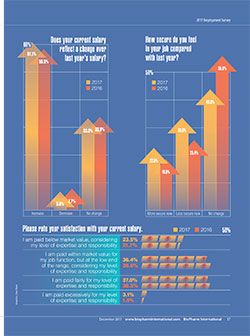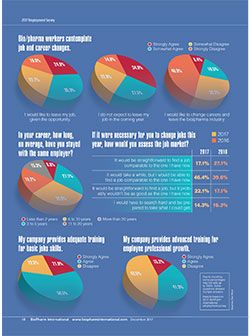
- BioPharm International-12-01-2017
- Volume 30
- Issue 12
Survey Measures Biopharma Career Highs and Lows
Biopharma employees reveal employment objectives, opportunities, and frustrations.
Complex biologic drugs, including personalized medicines, demand more sophisticated formulation and manufacturing methods, as well as talented, experienced pharmaceutical scientists and engineers to deliver therapies to patients. Advanced technology for manufacturing is expected to increase the required skill sets of biopharma workers.
These factors suggest a challenge for biopharma employers and a positive employment picture for biopharma employees. Consider the active mergers and acquisitions nature of the biopharma sector, financial pressures from shareholders and payers, and pressure to reduce costs, however, and the end result may be conflict between employer priorities and employee career paths.
Respondents to BioPharm International’s annual employment survey (1) shared opinions about the current employment environment, expressed reservations about compensation and workloads, and indicated that better career opportunities were a top priority. While respondents working in the biologics-based drug sector generally agreed with their counterparts in the broader pharmaceutical market (2), there were some differences.
Respondents reported mixed opinions about business performance. More than 45.3% reported that business increased in 2017 compared to 2016 (3). The number reporting a drop in business activity rose slightly, and the number of companies hiring new workers dropped slightly from 27.5% in 2016 to 25% in 2017. The number of respondents who felt “more secure” in their positions in 2017 rose to 22.6% versus 18.6% in 2016 (2); however, more respondents said they felt less secure in 2017 (33.6%) compared with 25.4% in 2016 (
).
Opinions about the job market also varied. While 40.5% of the biologics-market respondents said the job market was moderately competitive (compared to 44.3% for the entire pharma audience), 24.1% of the biologics group (vs. 25% for global audience) said the market for jobs was competitive; there are more qualified candidates than open jobs. The remaining 35.4% said there are few qualified applicants for open positions and employers must compete for qualified candidates.
Survey respondent profile
The survey, fielded in September and October 2017, drew more than 180 responses from the United States (70%), Europe (18.6%), Asia (5.8%), and other regions. Respondents primarily were full-time, permanent employees (87.1% of respondents) at innovator biopharmaceutical companies (44.1%), generic-drug manufacturing companies (34.1%), contract research and manufacturing organizations (15.8%), and consulting firms (6.4%).
The respondents represented companies that develop or manufacture large-molecule drugs, vaccines, and cell therapy or regenerative medicines; more than half reported that their companies are also involved in small-molecule drug development, an indicator of the adoption of biologic drug development at more traditional pharma companies. The respondents worked at privately held companies (44.1%), publicly traded companies (34.1%), and non-profit/academic/government groups (17.7%).
Respondents in the biologics sector tended to work for smaller companies compared with the respondents in the broader pharma market. More than 36% work for companies with more than 5000 employees (vs. 42.2% for the entire pharma market). More than 40% work for companies with fewer than 500 employees, vs. 34.4% for the broader pharma market.
The respondents were evenly split in tenure in the biopharma industry; 29.3% had fewer than 10 years of experience, 31.7% had 10-20 years, 30% had 20-35 years of experience, and 9% have worked in the industry for more than 35 years. About one-half of the respondents worked outside the bio/pharma industry for more than five years. More biologics-based workers held doctorate-level degrees or higher (41.2%) compared with the broader market (34.2%).
A lot more work, a little more pay
Click to view PDF.
Graphics: Dan WardThe survey indicates that biologics-based employees work more hours than counterparts in the broader pharma market. Workloads increased significantly in 2017, with 65% reporting increases compared with more than 51.3% in 2016. Nearly 40% of the respondents said they worked more hours in 2017 than two years ago, up significantly from 31.1% in 2016.
While 61% of the respondents said they were contracted to work approximately 40 hours per week, only 23.7% reported working 40 hours. Nearly 30% said they were contracted for more than 40 hours per week; however, 70% of the respondents said they work 40 or more hours per week.
Respondents reported similar paid vacation time in 2017 compared with 2016; 48.7% were eligible for four or more weeks of paid vacation; 31.6% reported that they used their full allotment of vacation, personal, and sick time, up slightly compared to 2016. One-quarter of the respondents said they used less than half of the available time off.
Salaries were up slightly; 61.1% reported a salary increase in 2017, up from 58.5% in 2016. Satisfaction with salary levels were similar to the past two years; more people in the biologics sector were dissatisfied with their compensation levels, in comparison to the broader pharma market. Nearly 60% were dissatisfied with their compensation; 36.4% of the respondents said they were paid at the low end of the salary range for their job function for their expertise and responsibility; 23.5% said they were paid below market value (
).
Current job, or long-term career
Click to view PDF.
Graphics: Dan WardWhile three-quarters of the respondents have more than 10 years of experience in bio/pharma, 9% said they stayed with the same employer--on average--for less than two years; 27.1% stayed for three to five years. Less than one-third of the 2017 respondents said they stayed with an employer for an average of 6-10 years; 33.5% stayed with the same employer for more than 10 years (
).
In addition to salary and benefits, employee recognition can play a role in job satisfaction. Similar to the global audience responses, most respondents said their work is fully valued by their employer (30% strongly agreed; 42% agreed). More than 82% of respondents said their skills and training are used to the fullest level. Only 52% see opportunity for career advancement in their current position; 63% reported opportunities for professional advancement at their current companies.
Respondents also expressed opinions about factors that would motivate them to change jobs; intellectual challenge (33.4%), work/life balance (30.2%), and professional advancement (29%) were the top factors. Non-financial incentives were singled out as “the main reason I come to work.” Respondents ranked intellectual stimulation (32.1%), challenging projects (33.1%), and the company’s potential for success (27.2%) as the top reasons.
Low pay, however, was noted by 19.3% of respondents as the leading sole factor to leave a job. Other top reasons cited include discrimination (16.6%), negative workplace attitudes (16.6%), and issues with management (13%).
Disillusioned workforce?
The survey revealed a growing desire to seek new employment. More than half of the 2017 respondents (59.3%) “agreed somewhat” or “agreed strongly” that they would “like to leave their job, given the opportunity,” up from 54.5% in 2016. More than one-third said they were “likely to leave my job voluntarily in the coming year;” almost 15% expected to leave their job involuntarily. Nearly 30% said they would like to change careers and leave the biopharma industry (
).
While the desire to change positions is strong, the number of people actually changing jobs is significantly less. In 2016, 17.1% of respondents reported a voluntary job change; in 2017, that number moved up slightly to 17.3%.
Respondents assessed a tougher path to finding a new position, compared with 2016; 17.1% said it would be straightforward to find a comparable new job; 46.4% said it may take a while, but they would be able to find a comparable position. More than 22% said it would be straightforward to find a job, but the new job probably would not be as good as the current position; 14.3% anticipated a difficult search and they would have to take whatever position was available (
).
References
1. 2017 BioPharm International Employment Survey, BioPharm International, 2017.
2. 2017 Pharmaceutical Technology/Pharmaceutical Technology Europe Employment Survey, Pharmaceutical Technology, 2017.
3. 2016 BioPharm International Employment Survey, BioPharm International, 2016.
Article Details
BioPharm International
Volume 30, Number 12
December 2017
Pages: 16-19, 49
Citation
When referring to this article, please cite it as R. Peters, “Wanted: A Highly Skilled Biopharma Workforce," BioPharm International 30 (12) 2017.
Articles in this issue
about 8 years ago
Transformative Medicines Challenge FDA and Manufacturersabout 8 years ago
Biopharma Outsourcing: A Year in Reviewabout 8 years ago
What’s in Your SOP?about 8 years ago
Reducing Cross-Contamination Risks in Process Chromatographyabout 8 years ago
Wanted: A Highly Skilled Biopharma Workforceabout 8 years ago
Modernizing Lyophilizationabout 8 years ago
QbD Improves Cell-Culture Process Controlabout 8 years ago
Single-Use Bioreactors Pose E&L Challengesabout 8 years ago
Roadmap Leads to Innovative Biomanufacturing Strategiesabout 8 years ago
Reliability Rooms and the Move to Proactive Supply Chain ManagementNewsletter
Stay at the forefront of biopharmaceutical innovation—subscribe to BioPharm International for expert insights on drug development, manufacturing, compliance, and more.






